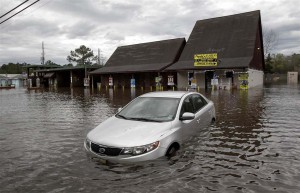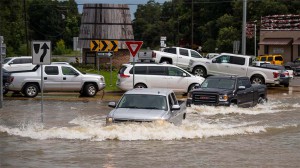Devastating floods have hammered several parts of the country in recent weeks, leading to a number of deaths and injuries and heavily damaging many communities in Louisiana, West Virginia and several other states.
But as the waters begin to recede, the storms have also left behind thousands of flood-damaged vehicles, according to industry experts, and they worry that many of those could wind up back on the U.S. car market, their titles “washed” so that unsuspecting buyers don’t realize the risks they face.
It’s not illegal to sell a flood-damaged vehicle. You can find auctions that specialize in them with a quick online search. But while those vehicles are supposed to be clearly identified, that’s not always the case with less scrupulous resellers. And if you’re not careful, you could wind up finding yourself underwater considering the costly repairs such vehicles may need.
While flood-damaged vehicles can undergo cosmetic repairs, that is more likely to mask, rather than resolve, longer-term issues, such as rust, mold and mechanical problems that could plague buyers later on, experts warn.
“A car that’s been in a flood, with the engine emerged for any length of time, will never be the same,” Carl Sullivan, a veteran inspector for California-based AiM, told TheDetroitBureau.com.
The actual number of vehicles impacted by a flood is likely to be significantly higher than formally reported because many older models might not have relevant insurance coverage, notes the National Insurance Crime Bureau.
Legally, any vehicle damaged or declared totaled due to flooding should have that clearly marked on its title. Most of them will either be scrapped and recycled or they may be broken down for parts.
“Unfortunately, some of the flooded vehicles may be purchased at bargain prices, cleaned up, and then taken out of state where the VIN (the unique Vehicle Identification Number) is switched and the car is retitled with no indication it has been damaged,” noted the NICB in a warning statement.
Appropriately, the process is known as “title washing.”
Meanwhile, individuals with flood-damaged cars with no insurance coverage may simply repair the vehicles and put them on the market without disclosing that information.
(Are your car’s airbags too old to be trusted? Click Here for that exclusive report.)
CarFax, a service that helps used car buyers validate title information and a vehicle’s history, estimates that a large number of damaged vehicles routinely go back on the market. Of the 75,000 cars, trucks and crossovers affected by 1999’s Hurricane Floyd, for example, CarFax estimated half were eventually resold.
That’s not necessarily illegal, as long as buyers are told of the damage.
Even if a flood-damaged vehicle has undergone repairs, experts stress that long-term issues could emerge. They point to rust in areas where water might have pooled. Electrical circuits, such as head and taillights are more prone to shorting out. And mold can develop in hidden places.
Experts warn that today’s vehicles are particularly prone to long-term issues due to the extensive use of microcomputer systems for everything from engine controls to safety devices.
(Drowsy driving crashes, deaths on the rise. Click Here for the story.)
They offer several tips for cautious shoppers:
* Newly replaced upholstery or trunk liners may hint at flood repairs;
* Look for rust in places normally not prone to damage, such as upper door hinges and trunk latches;
* Rust or mud under the gas and brake pedals;
* Beads of water in places like a vehicle’s dome light;
* A musty or moldy smell.
Buyers should also make sure the VIN number on the dash matches the one on the vehicle’s driver door jamb.
If you have any doubts, make sure to take the vehicle to a good mechanic for a thorough inspection, especially underneath, where water damage is most easily spotted.
(Traffic congestion can eat a week of your time – and $1,000 – each year. Click Here for the story.)


